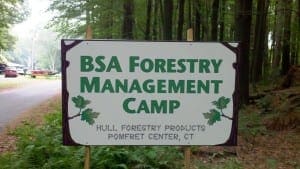
Managing for Multiple Use: The Mark Greer Scout Reservation
Like so many Scout properties, Camp Tadma, an active boys summer camp in Bozrah, CT found itself on the chopping block in 2010 as the Boy Scout Council considered selling the 340-acre property. Friends of Camp Tadma Chairman Bruce Sullivan hoped that a timber harvest would generate some additional income and also improve the long-term health and productivity of the forest, making it more attractive to the Council. Hull Forest Products had conducted timber stand improvement work at Camp Tadma in the 1980s. Now the time had come to revisit those woods.
According to Chris Casadei, the forest resource manager at Hull Forest Products who was assigned to Camp Tadma, “When a forester revisits a woodlot that has responded nicely to the sound management practices applied by his predecessors, there is a feeling of great satisfaction.” “This feeling was abundant as I cruised the productive stands on the opposite side of Tadma Pond at the Mark Greer Scout Reservation. The vigorous growth was a direct result of our timber stand improvement work from the 1980s.”
Managing for Income & Recreation
Casadei reworked the property’s forest stewardship plan to reflect the current conditions and presented his findings and recommendations to the Council’s property committee. He scheduled a timber harvest to take place over two successive winters so it would not conflict with the activities of the seasonal camps held on the property for hundreds of Cub Scouts. Management prescriptions within the stand were tailored to the woodland’s current condition and the way it had responded to the previous work. “We did areas of timber stand improvement and intermediate sawtimber thinning, as well as two small areas of shelterwood harvest,” says Casadei, adding “There was also some ‘while you’re here with the equipment’ clearing of a few new campsites and some problem tree removal within the camp.”
Benefits for the Camp & the Campers
First and foremost, the forest itself has benefited from a flush of natural regeneration and the accelerated growth of the residual stand. The woodland will continue to provide quality wood, clean air and water, recreational opportunity, and wildlife habitat.
Camp Tadma has reestablished itself within the Council as a viable piece of the Connecticut Scouting experience and for the time being, talk of closing the camp has ceased. Whether the income from the timber sale influenced the fate of the camp has yet to be acknowledged, but it certainly could not have hurt.
The objectives and activities of the first winter harvest at Camp Tadma were profiled by the Norwich Bulletin, providing both the camp and Hull Forest Products with great publicity.
Camp Tadma has turned the managed areas into a forestry classroom, and campers hike through the different stands, learning firsthand about woodland management. The Friends of Camp Tadma were so pleased they proudly erected a “BSA Forestry Management Camp” sign at the camp’s entrance. Cub Scouts now have the opportunity to learn firsthand how working forests provide multiple benefits, including wildlife habitat, a sustainable supply of timber, and recreational opportunity.







